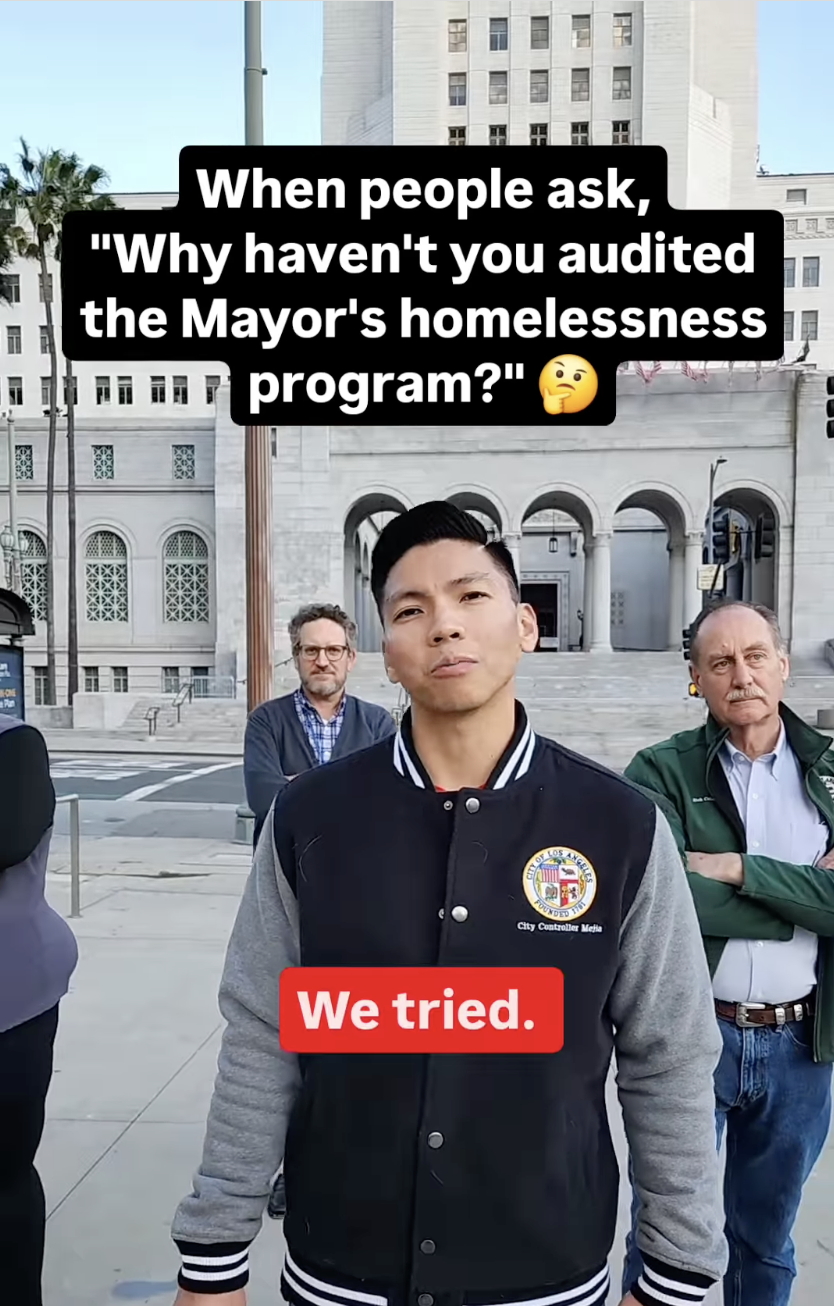Los Angeles City Controller Kenneth Mejia has been thrust back into the center of the city’s homelessness debate, this time by order of a federal judge. In a move that could redefine the city’s balance of power, U.S. District Judge David O. Carter has appointed Mejia to serve as liaison to a newly named third-party monitor overseeing Los Angeles’s compliance with its homelessness settlement with the nonprofit L.A. Alliance for Human Rights.
The judge’s October 14 order names cybersecurity and data-forensics expert Daniel Garrie as the independent monitor and directs Mejia to support him by “facilitating data access and coordination.” Carter called Mejia “the most knowledgeable person regarding the myriad and complex funding streams involved with the homelessness system” and emphasized that his participation would come at no additional cost to taxpayers. Garrie’s team will audit city data to verify whether Los Angeles is living up to its commitments to create nearly 13,000 new shelter beds and clear encampments across the city.
For Mejia, who has spent nearly three years fighting to examine the city’s homelessness spending, the appointment marks a turning point. Since taking office, he has clashed with Mayor Karen Bass and City Attorney Hydee Feldstein Soto over his right to conduct performance audits of mayoral programs, including Inside Safe, the city’s flagship initiative to move unhoused residents into hotels and motels. Bass’s office has maintained that “a city elected official should not conduct a performance audit of another elected official,” while the City Attorney has cited a 2009 ruling that barred then-Controller Laura Chick from auditing the City Attorney’s workers compensation unit.
Those legal barriers have left Mejia unable to fulfill what he describes as the Controller’s core mandate: to serve as the city’s independent watchdog. When Bass refused to cooperate with an Inside Safe audit last year, Judge Carter ordered an outside review that cost nearly $3 million. Now, through the federal court, Mejia has been granted access to the very data City Hall once withheld — effectively doing the job he was prevented from doing under local law.
The monitor’s work will go far beyond traditional accounting. Carter’s order outlines an unusually technical scope, requiring expertise in timestamp validation, data integrity, and source attribution. Garrie must verify that every figure released by the city is traceable to its original documentation, including shelter logs, field records, or invoices, and distinguish verified data from estimates. Mejia’s office will facilitate that process by opening access to city databases and helping reconcile financial reports across departments.
The city’s legal team initially objected to Garrie’s proposed scope and budget, arguing that his plan was “unduly expansive.” Carter disagreed, finding his proposal “the most viable and economical option” and noting that Mejia’s unpaid participation would further reduce costs. The judge’s decision comes amid mounting public scrutiny of homelessness spending: in recent weeks, federal prosecutors charged two developers with misusing state homelessness funds, and RAND researchers found major undercounts in the region’s official homelessness data.
The federal appointment also strengthens Mejia’s ongoing campaign to expand the Controller’s powers through the city’s Charter Reform Commission. In August, Mejia formally asked the commission to propose six amendments, including one clarifying that the Controller may conduct performance audits of all city programs that use taxpayer dollars, regardless of whether they are run by the Mayor, City Attorney, or Council offices. His letter warned that the City Attorney’s narrow interpretation of the Charter had “created an oversight loophole” allowing officials to house major programs in their own offices to avoid scrutiny.
Carter’s order exposes that loophole in practice. By empowering Mejia to help monitor homelessness spending, the federal court effectively overrode City Hall’s restrictions, acknowledging the Controller’s expertise and independence even as the city’s own legal framework continues to constrain him. It’s a vivid illustration of the argument Mejia has made to the Charter Commission: when local government weakens its own watchdog, accountability ends up being imposed from the outside.
If the commission adopts Mejia’s recommendations, voters could be asked as soon as November 2026 to decide whether to make those changes permanent. His proposals would also designate the Controller as the city’s Chief Financial Officer, create an independent budget tied to a fixed share of the general fund, and enshrine the office’s fraud and waste investigations into the Charter. These are measures designed to insulate oversight from political interference.
For now, Carter’s order gives Mejia what he has long sought. He will have a direct role in tracking how homelessness dollars are spent and whether they produce measurable results. In court last month, he told the judge his office’s two-person team is already reviewing hundreds of pages of city contracts to feed into public dashboards. Carter praised Mejia’s transparency work, saying it brought clarity to an issue long clouded by politics.
Attorney Elizabeth Mitchell, representing the L.A. Alliance, called the appointment “a positive step” but questioned whether city officials would cooperate with Mejia. Councilmember Tim McOsker, who has raised concerns about the city’s legal fees in the case, supported the move as fiscally prudent. “It is imperative that we give value to the taxpayers of the city of Los Angeles,” he said.
The monitoring process begins immediately, with Garrie and Mejia expected to review the city’s next quarterly homelessness report due in November. Whether this temporary court-ordered partnership will prompt lasting structural reform remains to be seen. But for now, Los Angeles’s elected Controller, long sidelined in his push for transparency, has been placed squarely at the center of the fight to account for billions in homelessness spending.

